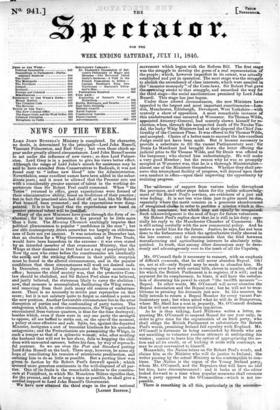NEWS OF THE WEEK.
LORD Joistrz RUSSELL'S Ministry is completed. Its character, no doubt, is determined by the principals—Lord John Russell, Viscount Palmerston, and Earl Grey ; but even those chiefs ap- pear under greatly altered circumstances. Lord John Russell seems to act under the influence of new views ; so does Lord Palmer- ston. Lord Grey is in a position to give his views better effect. Although the range of Lord John's search for assistance may be said to have extended from Conservatives to Radicals, it was not found easy to " infuse new blood" into the Administration. Nevertheless, some excellent names have been added in the subor- dinate posts ; and it must be allowed, that the Premier sets out with a considerably greater amount of talent in the working de- partments than Sir Robert 'Peel could command. When the Tories" returned to office, great expectations were formed of their administrative ability, based on traditions of their practice ; but in fact the practised men bad died off, or had, like Sir Robert Peel himself, been promoted ; and the expectations were disap- pointed. It is to be hoped that the expectations now based on greater personal talent will be justified. Many of the new Ministers have gone through the form of re- election ; for in most instances it has proved to be little more than a • form. The Morning Chronicle exultingly imputes that political phsenomenon to popular " confidence in the men " ; but our able contemporary.draws somewhat too largely on oblivious- ness of facts not yet ancient. It was notorious in December last, that an election for a Whig Government, aided by Free Trade, would have been hazardous in the extreme : it was even stated by an intended member of that evanescent Ministry, that the Whigs at their dismissal in 1841 had not a rag of popularity left. Now tk men who come before the constituencies are identically the sam and the striking difference in their public reception must be found in the altered circumstances, and in the popular confidence that those circumstances will work out desired ends. In December, even Liberals deprecated the Whig accession to - office ; becaUse the chief anxiety was, that the protective Corn- • law should be abolished, and Sir Robert Peel alone was believed, and justly believed, the statesman likely to carry the abolition : now, that measure is accomplished, facilitating the Whig return, and removing from their path many old sources of embarrass- ment. There is no necessity to revive past reproaches on that score ; but it is not salutary quite to forget so cardinal a point in the new position. Another favourable circumstance lies in the utter -disruption of parties and the confounding of party tactics. The antagonism which, in other circumstances, the Whigs would have encountered from various quarters, is thus for the time destroyed ; besides which, even if there were in any one party the strength to oppose, all are baffled to strike out, on the spur of the moment, apolicy at once effective and safe. Spite, too, against the departed Minister, instigates a sort of transient icind'ness for his quondam antagonists ; and the Protectionists are patronizing the Whigs, in such a temper as that of a splenetic woman; who, after scolding the husband that will not be her slave, falls to hugging the chil- dren with unwonted caresses; before his face, by way of reproach- ful contrast. So we see even the Post and Standard patting Lord /ohn Russell on the back. There may, however, be some sly hope of conciliating his remains of aristocratic predilection, and enticing him to do es little as possible. But a parting blow was given to faction by Sir Robert Peel's farewell speech ; which aroused more generous sentiments in the well-disposed of all par- ties. One of its fruits is the remarkable address to the constitu- ents at Pontefract, in which Mr. Monckton Milnes signifies that, for the present, and for as long a time as possible, he shall give a cordial support to Lord John Russell's Government.
We have now attained the third stage in the great national movement which began with the Reform Bill. The first stage was the struggle to develop the germ of a real representation of the people ; which, however imperfect In its extent, was actually established and put in operation. The next stage was the struggle to abolish the ascendancy of class interests, which were assailed in the "monster monopoly ' of the Corn-laws. Sir Robert Peel gave theespewning stroke to that struggle, and smoothed the way for the third stage—the social ameliorations promised by Lord John Russell. This stage has just begun.
Under these altered circumstances, the new Ministers have appealed to the largest and most important constituencies—Lon- don, Manchester, Edinburgh, Devonport, West Yorkshire—with scarcely a show of opposition. A most remarkable instance of this unobstructed ease occurred at Worcester. Sir Thomas Wilde, appointed Attorney-General, had scarcely shown himself for re- election, when, through the unexpected death of Sir Nicolas Tin- dal, the lucky, Whig Ministers had at their disposal the Chief Jus- ticeship of the Common Pleas. It was offered to Sir Thomas Wilde, and accepted.. Choice of a better man to succeed the late excellent Judge could not have been made. But it became necessary to provide a substitute to fill the vacant Parliamentary. seat: Sir Denis Le Merchant had brought down the letter offering the judicial prize to Sir Thomas Wilde, and Sir Denis was offered to the burgesses; who elected him unhesitatingly. He will make a very good Member; but the reason why he was so promptly accepted at Worcester was, that he is a thorough Ministerialist-- almost one of the Ministers themselves. Whether they.shall pre- serve this triumphant facility of progress, will depend upon their own conduct in office—upon their improving the opportunity by realizing progress.


























